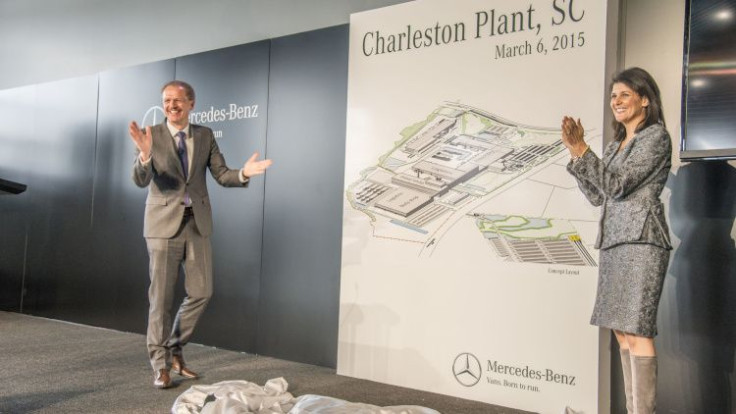US South Wins More Automotive Factory Business: Mercedes-Benz In South Carolina

After 14 years of selling the Mercedes-Benz Sprinter commercial van in the U.S., Daimler AG will shift production of the popular vehicle from Germany to North Charleston, South Carolina. The move adds another manufacturing location to a growing list of sites run by foreign automakers attracted by the American South’s absence of unions and lower labor costs. But we don’t know how much South Carolina is paying in incentives to lure the plant.
“The region has very highly skilled workers, a dense network of reliable suppliers, and an outstanding logistics infrastructure that includes good transport connections to the nearby harbor,” Volker Mornhinweg, head of Mercedes-Benz Vans, said at the official announcement of the plant’s location March 6. “Just as important is the very good cooperation and support we’ve experienced at the local, municipal and state levels. I would particularly like to thank Governor [Nikki] Haley and the many other people who’ve given this project their fullest support.”
The luxury automaker will break ground next year on a $500 million, 200-acre complex that will reportedly employ 1,300 people. By building the vans in the U.S., Mercedes-Benz would avoid the steep 25 percent American import tariff on cargo vans. The company currently has an operation in nearby Ladson that assembles so-called knockdown kits of German-made Sprinters. But the new factory would have a body shop, a paint shop and a full assembly line to make the vans in the U.S.
The plant is yet another feather in the South’s auto-industry cap. Foreign automakers such as Honda, Hyundai/Kia, Nissan and Toyota have already established manufacturing footprints in Alabama, Georgia and Mississippi. Coastal South Carolina has seen explosive growth in automotive-parts suppliers making everything from radiators to seats. During the past six years, the number of such suppliers has grown to 401 from 305, according to the state Commerce Department.
In January, Mercedes-Benz USA announced it was relocating its headquarters to Atlanta from Montvale, New Jersey, “to achieve the sustained, profitable growth and efficiencies we require,” company CEO and President Stephen Cannon said at the time.
South Carolina’s Coordinating Council for Economic Development said the state had offered Mercedes-Benz job development credits, which would provide the company with tax credits for creating jobs, as well as a $14 million grant to help develop the factory site.
However, Good Jobs First, a watchdog group that tracks corporate incentives offered by states, has indicated South Carolina ranks close to the bottom in disclosing the extent of government tax credits and other incentives.
“South Carolina is a transparency story,” said Greg LeRoy, executive director of the Washington-based nonprofit organization. “We’ve looked at past deals in South Carolina and have dealt with transparency issues. When we graded them on transparency ... they received goose eggs [zeros] on nearly all of their programs.”
Unlike its neighbor North Carolina, which has been more transparent about the subsidies and tax breaks it provides businesses that have set up there since 2003, South Carolina doesn’t provide public information about the corporate tax credits it grants. Obtaining data about some forms of subsidies can require a freedom-of-information request there, while the same kind of information is available online in other states.
Mercedes-Benz was not immediately available to provide the total amount of incentives offered by South Carolina. However, Gov. Haley has lauded her state’s anti-union, pro-business climate as an important component of the state’s economic development.
“What we do with our companies is say, ‘Take care of those who take care of you,’” the Associated Press quoted Haley as saying of unions last week. “The associates like that direct relationship that they have with their employer. They don’t want that middleman.”
© Copyright IBTimes 2024. All rights reserved.






















